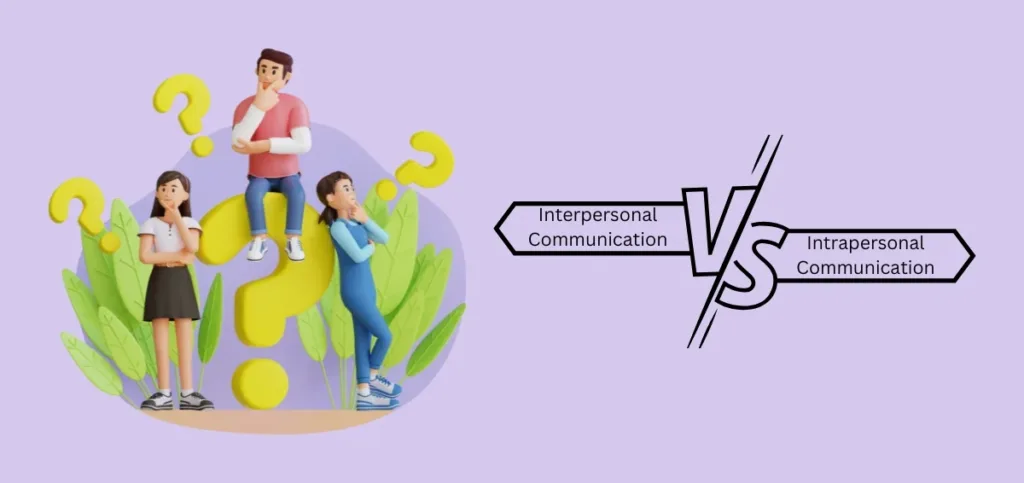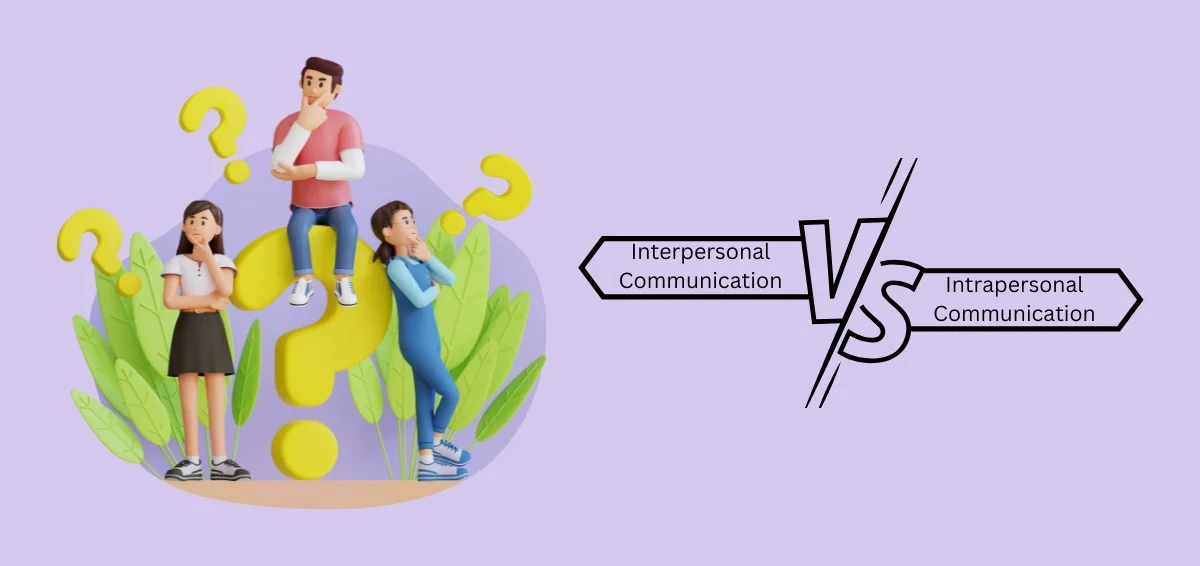
Interpersonal vs intrapersonal communication styles lay the foundation of social and emotional development. These communication types happen between and within people. Both involve different skills and have varied significance. It is essential to develop both to navigate life successfully. In this article, we’ll explore the key differences between interpersonal vs intrapersonal communication and how to develop each of them.
Must Read: How Thank Someone for Money?
What Does Interpersonal Communication Mean?

Interpersonal communication refers to the exchange of information, feelings, and ideas through both non-verbal and verbal means. Have you ever come out of a workplace meeting wishing that you had responded differently? Maybe there was an important presentation, and you felt like you could ask better questions, but somehow couldn’t.
This scenario is common with those who aren’t exposed to much face-to-face conversation. Besides the simple voicing of your message, interpersonal communication also includes the facial expressions, gestures, body language, and tone of voice that accompany it.
Table of contents
- What Does Interpersonal Communication Mean?
- What Does Intrapersonal Communication Mean?
- Interpersonal vs. Intrapersonal Communication: How Do They Differ?
- The Importance of Interpersonal Communication
- The Importance of Intrapersonal Communication
- How to Become Good at Interpersonal Communication?
- How to Improve Your Intrapersonal Communication?
- Concluding Words
What Does Intrapersonal Communication Mean?

Intrapersonal communication, also called inner speech, is a type of communication you do with yourself. It is the communication in your mind through thinking and feeling. Some major examples of this type of communication are self-talk, self-motivation, and affirmations.
It is in direct contrast with interpersonal communication, in which you communicate with another person(s). In intrapersonal communication, you see things in your mind, become aware of your thoughts, and visualize.
Interpersonal vs. Intrapersonal Communication: How Do They Differ?
| Point of Comparison | Interpersonal Communication | Intrapersonal Communication |
| Meaning | Interpersonal communication occurs between people. | Intrapersonal communication happens in the mind. |
| People involved | A single or more parties are involved. | Nobody except you is involved. |
| When does it take place | When you wish to interact with another person. | When you wish to know more about yourself or self-introspect.feedback |
| Feedback involved | Feedback is given from the parties. | Feedback is only individual. |
| Nature of the communication | Interpersonal communication is interactive and social. | Interpersonal communication is solitary. |
| Key examples | Listening, verbal and written communication, phone calls, presentations, texting | Self-talk, self-introspection, self-persuasion, self-analysis, visualization |
| Advantages | Builds meaningful relationships and dissolves conflicts. | Builds self-awareness and enhances problem-solving skills. |
| Media used | Computers, television, phones, verbal communication, letters | Mind, audio recordings, journals, and diaries |
The Importance of Interpersonal Communication

Becoming better at interpersonal communication helps you achieve more success (especially in the workplace). It also makes you grow as a person. This is because you acquire the ability to listen patiently and absorb what others are saying. Here are some major benefits of interpersonal communication.
1. Become better at solving problems and conflicts
People with good interpersonal skills take time to listen to others and respect their opinions. They brainstorm solutions and discuss problems at length. It enables them to resolve issues and conflicts, both in their professional and personal lives.
2. Makes you a trustworthy figure
Good interpersonal skills help you express yourself clearly. It lets others understand and trust you more. This, in turn, lets you build connections and mutual understanding.
3. Prevent chances of miscommunication
A person with better interpersonal communication skills is more in sync with how others are feeling. So they are less likely to misunderstand them or believe rumours about them. It minimizes the chances of miscommunication.
The Importance of Intrapersonal Communication

Intrapersonal communication mainly includes talking with oneself in thought, visualization, verbal, and imagination. This kind of communication helps you form the foundation of your relationships with others. Through it, you develop yourself emotionally and communicate your needs and desires better. Interpersonal communication benefits you in the following ways:
1. Allows you to understand yourself deeply
Intrapersonal communication lets you reflect on how you are feeling. It, in turn, increases your self-awareness. You acquire a deeper understanding of yourself, which leads to personal development.
2. Helps with emotional regulation
Intrapersonal communication lets you manage your emotions better. When you reflect on your feelings, you understand the causes for them. Thus, it enables you to develop techniques to cope with anxiety, stress, and other emotions.
3. Makes it clear on your life’s vision
Intrapersonal communication, like self-talk and journaling, brings you closer to your aspirations. When you are clear on them, it feels easy to match your actions with your behaviours. This helps you fulfil your aspirations and achieve inner peace and happiness.
Must Read: How to Be More Persuasive
How to Become Good at Interpersonal Communication?

People with good interpersonal communication skills are very valuable. They can shape their personal and professional lives positively. Good communication of this kind lets you give a solid voice to your opinions.
To become good at interpersonal interaction, do these things.
- Voice your thoughts concisely and clearly. If your job role involves communication in writing, working on expressing yourself will benefit you.
- Listen attentively. Fully concentrate on the words of others so you can contribute to the conversation meaningfully.
- Focus more on your non-verbal communication. Your facial expressions and body language reveal much about what you want to convey.
- Take stock of the situation from the perspective of others to know why people are feeling what they are feeling.
- Look for common areas of interest to gel well with the other person. Also, you are likely to build a better bond when some of your interests and experiences are common.
- Do not feel bad about criticism. Ask for feedback about your work, and learn and grow from it.
How to Improve Your Intrapersonal Communication?

People with good intrapersonal communication skills experience huge personal growth. They can understand themselves better. Also, they react suitably to situations.
Here are some valuable strategies to enhance skills for this communication.
- Inculcate mindfulness through meditation and yoga. It enables you to become aware of your thinking patterns.
- Introspect and ask yourself questions about yourself. It will help you discover your weaknesses and strengths.
- Practice journaling every day. Daily journaling practice makes you aware of how you are reacting to people and events in your life.
- Visualize how you want your life to become. It stimulates good feelings, which boosts the mood. It also boosts the happiness level.
Concluding Words
Cultivating empathy, compassion, self-awareness, and resilience is crucial to succeed in life. Interpersonal vs intrapersonal communication skills empower you in each of these domains. Both these forms of communication are significant for professional and personal progress. A balance of both helps build meaningful relationships in your life.










